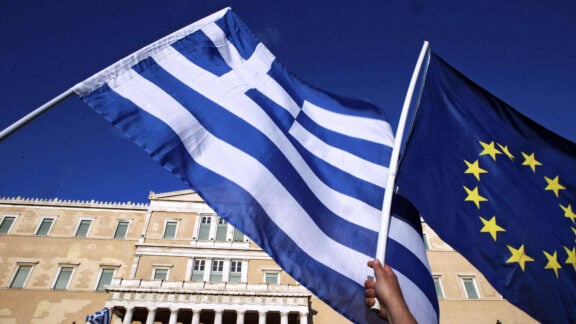What the architects of the European project had sought was the political and economic union of the member states in a common pursuit of the European citizens’ best interests. To participate, each country was required to be a stable democracy, have a functioning market economy capable of competition within the union (EU), and be prepared to accept the obligations of membership.
There was a time when such a project seemed both appealing and workable. Not any longer. As the next elections for the European Parliament are set for May 2014, the European project looks old, unattractive, and, perhaps, unrealistic. It is plagued by three interrelated crises: a fiscal and economic crisis; a crisis of representation; and a crisis of liberal democracy itself.
The economic crisis, firstly, has eroded the idea that the European project would be a one-way street to economic prosperity. According to data by the Eurostat, real per capita output across the EU is now below what it was in 2008. At the same time, a deep rift has developed in Europe about the best remedy for saving the euro. While most of the European North stands for austerity, strict rules on borrowing, and sanctions against non compliant governments, Europe’s South calls for more active redistribution from richer to poorer members and fiscal stimuli, whether through cheaper borrowing or outright fiscal transfers.
The representation crisis, secondly, is rendering dubious the time-honoured practice of voters delegating decisions to their representatives in Brussels and Strasbourg. It is also the main cause of rising euro-scepticism. During the years of economic growth, the EU could afford to remain an elite venture in which mainstream politicians were expected to work in a dispassionate and gradual way towards a closer union. Once things started to go wrong in the economy, though, voters began to demand from their representatives more accountability, transparency, and efficiency. The crisis of liberal democracy, finally, is becoming evident with the proliferation across Europe of non-democratic (and, often, neo-fascist) parties, which for the first time in postwar history are now electorally significant, thus being able to further amplify their ideas on xenophobia, racism and anti-Semitism. Although those parties will remain a small minority in the next European Parliament, they are currently strong and quite vocal in several EU countries (including Greece, Hungary, Bulgaria, but also Sweden, the Netherlands, the UK) thus representing a toxic hazard.
Taken together, these crises have eroded the EU’s guiding idea: that European citizens support the EU in return for economic prosperity and political democracy. To understand Europe’s current predicament, you have to look no further than its most troubled member, Greece.
Greece’s admission into the European Union signified the commitment of its leaders to enlargement and their ambition to extend the Union to the recently democratized South. That was in 1981, and, some initial quibbles apart, Greece set out determined on adhering to the European project. For many years thereafter, the Greeks experienced clear benefits from membership, not least in monetary terms. Few Greek citizens really believed that the EU was a bad idea. That picture is now being reversed, as the majority of Greeks discover that the EU is not after all such a good idea. What has changed? As with many other countries in Europe, only far more severely, Greece has been hit by all three crises already mentioned.
At the level of economy, first, the current financial and economic crisis has caused prolonged austerity, negative growth, and increasing unemployment, currently standing at a staggering 27 per cent. Nor is the European Parliament a popular institution among Greeks; like elsewhere in Europe, it is seen as a self-serving guild tainted with greed, corruption, inefficiency, and backstage politics. When it comes to the Greeks’ faith in liberal democracy, the latest electoral results, and their aftermath, speak volumes.
In the twin national elections of 2012, Greece’s old party system collapsed as voters abandoned in droves the mainstream ‘government parties’ of centre-right ND and centre-left PASOK, and turned to mostly newly emergent competitors to both the left and the right of the political spectrum. Among the new winners were SYRIZA, a formerly negligible force, which, because of its uncompromising anti-austerity stance, was elevated to major opposition party, and the thuggish Golden Dawn (GD) party, which scored about 7 per cent of the vote. After that election, Greece became polarised between two (otherwise multifarious) groups of political forces depending on whether they stood for preserving the existing political system and Greece’s position in the EU (and the Eurozone) through painful, but also uncertain, reforms, or were for a root-and-branch change of the system, thus however jeopardising Greece’s European future.
What, then, is to happen in Greece in the forthcoming European elections, which, not without a certain irony of history, will take place while this country holds the EU presidency?
Most certainly, the contest will be primarily about settling scores from the last national elections. The country is currently ruled by a coalition government of ND and PASOK, which attempts to implement unpopular austerity measures at a great cost to its public support. After a series of defections since 2012, the coalition government has seen its number of lawmakers decrease from 179 to only 153 in the 300-seat parliament. Recent polls, moreover, show that ND, the majority party, is falling behind SYRIZA, which intends to renegotiate or even tear up Greece’s bailout deal with its creditors. Meanwhile, the neo-Nazi GD has remained strong in the polls (recently at about 10 per cent) despite the fact that its top brass have been jailed on charges of criminal activity after the murder of a left-wing rapper.
If SYRIZA finishes first in the European Parliament elections, Alexis Tsipras, the party leader, has made it pretty clear that his party will not recognise the government’s mandate. The same will happen if SYRIZA obtains positive results in local elections across Greece, which coincide with the European ones. In either case, SYRIZA is almost certain to push for national elections to be held in 2014, hoping to win, and then cancel the bailout terms.
Whatever the case, it is also certain that Greece’s pro-EU bloc of parties will suffer great losses. While ND is expected to win the same number of seats as SYRIZA, formerly formidable PASOK is going to see its strength in the European Parliament diminish dramatically from its current seven seats to only one or two. The remaining seats will be distributed among such anti-EU parties as Golden Dawn, the Greek Communist Party, and the rightist populist Independent Greeks. It is doubtful whether the Democratic Left, a pro-EU moderate leftist party, or any other liberal force that may meantime emerge, will be able to obtain any seats at all.
Of course, high rates of electoral abstention will be a key factor, which is expected to determine negatively the strength of the mainstream pro-EU parties. But this is not a certainty. Although abstention has been constantly on the rise (voter turnout has declined from a high 78.6 per cent in 1981 to only 52.6 per cent in the European elections of 2009), the local elections, combined with increased polarisation may halt, or even slightly reverse, this trend.
What is going to happen to Europe if Greece’s anti-EU forces win over pro-EU ones? At first sight, not much – especially as Greece occupies a paltry 21 out of 751 seats in the European Parliament. Look at the bigger picture, though, and you will realise that the Greek vote is quite consequential for the EU project.
Because of the enormity of its (economic and political) crisis, Greece has become both exemplary and highly symbolic grounds for the big battle to be waged in May throughout Europe between pro-EU and anti-EU forces. As now seems more likely, the majority of the Greek representation in the European Parliament will form a miscellany of populist and non-democratic forces ready to throw into question the core principles of European integration as conceived by its early architects and pursued thereafter – political liberalism, open markets, an ever closer union.
This is no small damage. For the simple reason that, with Greece serving as a clear marker of disenchantment with the EU project, others may be tempted to follow.
*Takis S Pappas is an associate professor of comparative politics at the University of Macedonia, Thessaloniki, Greece and a Marie Curie Fellow at the European University Institute, Florence, Italy. This article was first published on opendemocracy.net
Advertisement
Greece and the European elections
Because of the enormity of its crisis, Greece has become both an example and a symbol of the big May election battle








